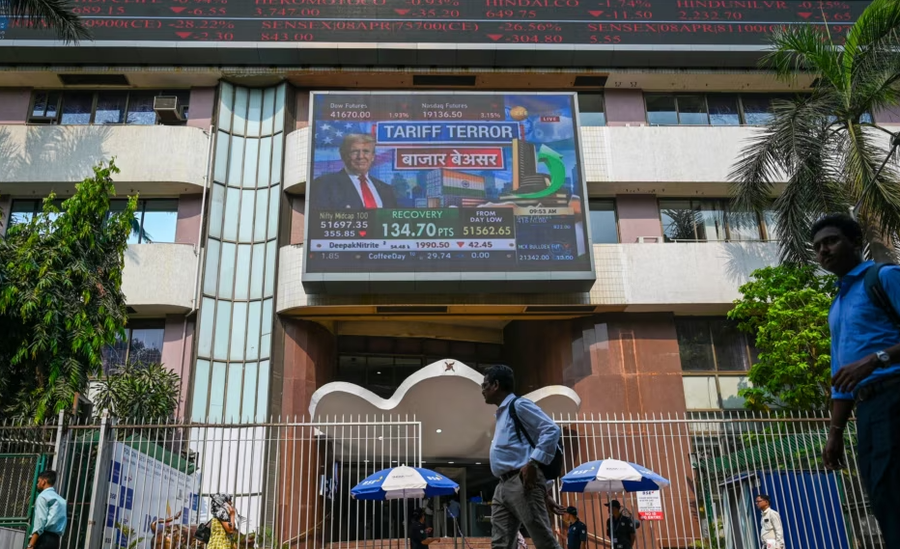
US President Donald Trump's decision to impose reciprocal tariffs on all countries has sparked reactions around the world, as countries have expressed fears of rising prices, while some countries have warned of countermeasures.
The US imposed a base tariff of 10 percent on imports from all countries in the world, including Kosovo, as well as higher tariffs on dozens of countries that have a trade surplus with the US.
The European Union reacted to Trump's decision, saying it is ready to respond to new US tariffs.
But European Commission President Ursula von der Leyen called on the US president to address his concerns through dialogue.
"I regret this choice," von der Leyen said. "There seems to be no order in this chaos. No clear path through the complexity and chaos that is being created, as all of the US's trading partners are being hit."
She added that the EU is "ready to respond".
"We are now preparing for further countermeasures to protect our interests and our businesses if negotiations fail," she said.
The EU was hit with 20 percent tariffs by the US. Previously, Trump had imposed tariffs on EU steel and aluminum imports, as well as vehicles and vehicle parts.
The bloc, however, has sought to resolve Trump's trade concerns through dialogue, and von der Leyen again left the door open to dialogue on April 3.
"There is an alternative path. It is not too late to address these concerns through negotiations," she said.
According to the senior European official, the new tariffs will affect consumers worldwide.
"It will be felt immediately. Millions of citizens will face higher food prices. Medicines will cost more, as will transportation. Inflation will increase," she warned.
Due to Trump's decision, French President Emmanuel Macron will meet on Thursday with representatives of French sectors "affected by American tariffs," the Elysee Palace announced.
The tariffs have also hit the United Kingdom, a Washington ally. London has said it hopes to reach a trade deal with Washington. But the UK's business secretary, Jonathan Reynolds, warned his country had "a range of tools at its disposal and we will not hesitate to act."
Italy, meanwhile, criticized the US decision on tariffs, urging the EU to reach a deal, saying a trade war would "weaken the West."
"The imposition of tariffs by the US on the EU is a measure that I consider wrong and is not in the interest of either party," said Italian Prime Minister Giorgia Meloni.
The German Automotive Industry Association has also criticized the tariffs, saying they will create “only losses.” Meanwhile, the German chemicals industry, which has the US as its largest export market, urged calm, stressing that “an escalation would only worsen the damage.”
China also pledged "strong opposition" to US tariffs on its exports and said it would take "countermeasures to safeguard our rights and interests."
The Chinese Ministry of Commerce said the new US tariffs "do not comply with international trade rules and seriously harm the legitimate rights and interests of relevant parties."
Beijing, which was hit with a 34 percent tariff, called on Washington to "immediately repeal" the tariff decision, warning that they "put global economic development at risk" and harm American interests and international supply chains.
Canada, a neighboring country of the US, said the US tariffs would "completely change the global trading system".
"We will counter these tariffs with countermeasures. We will protect our workers," said Prime Minister Mark Carney, who has previously vowed to respond to the US over previous tariffs from Washington.
Japan, meanwhile, said Trump's decision "is regrettable," adding that the new tariffs could undo the trade agreement the two countries have.
Japanese firms are the largest investors in the US, but Tokyo has failed to be exempted from Trump's tariff decision, with Japan hit with a 24 percent tariff.
"I have conveyed the message that the tariffs imposed by the US are regrettable, and I once again call on Washington not to apply these measures to Japan," said Japan's Minister of Trade and Industry, Yoji Muto.
He added that he spoke with US Commerce Secretary Howard Lutnick before Trump imposed tariffs on countries, including ally Japan.
The Japanese minister said he explained to Lutnick how the US tariffs would affect the US economy “by undermining the capacity of Japanese companies to invest.” Meanwhile, a Japanese government spokesman said the US measures may not be in line with World Trade Organization rules.
Taiwan, meanwhile, has called the US tariffs "unreasonable", saying that the government in Taipei intends to hold negotiations with Washington.
The self-governing island of Taiwan, in addition to the basic tariff, is hit with a 32 percent tariff.
Semiconductor chips, a sector in which Taiwan dominates and which has been a source of tension between Washington and Taipei, are exempt from the tariffs. However, analysts have warned that tariffs on other components will also have an impact on the chip industry.
Taiwan had a trade surplus with the US of $73.9 billion in 2024, making it the seventh country with the highest trade surplus.
To protect itself from the impact of US tariffs, Thailand, meanwhile, said it has "a strong plan," but the Thai government said it hopes to negotiate with Washington to reduce tariffs.
States in Southeast Asia have high trade surpluses with the US and have been hit with high tariffs by Washington.
On April 2, US President Donald Trump declared a national economic emergency to implement the tariffs, which are expected to generate hundreds of billions of dollars in annual revenue.
He has promised that factory jobs will return to the US as a result of these tariffs, but his policies risk an unexpected economic slowdown as consumers and businesses could face steep price increases for vehicles, clothing and other goods. (A2 Televizion)











